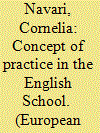|
|
|
Sort Order |
|
|
|
Items / Page
|
|
|
|
|
|
|
| Srl | Item |
| 1 |
ID:
177596


|
|
|
|
|
| Summary/Abstract |
Most theories in the social sciences have intimations of both structure and agency, but in the English School (ES) corpus these appear in a particular way. While the ES is often considered a “structural theory”, in fact, the corpus is largely agentic in orientation. That is, the dynamic elements in ES accounts of international life are either collective or individual agents who hold institutional positions. They are states, state leaders, non-governmental organizations (NGOs), development officers, agency bureaucrats, and so on. Moreover, the agents are, themselves, constantly involved in creating, elaborating, reaffirming, or altering the institutional environments of their action. They are searching out institutional possibilities that will aid their specific objectives, in the process reaffirming them, while also creating or altering the structures within which they act. This points to the significance of structuring processes—successive actions that create stabilizing effects and whose effects have consequences for what follows. Agents acting within, and interacting with, institutions place the ES in a family relationship with the “new institutionalism” and, more specifically, with structuration theory.
|
|
|
|
|
|
|
|
|
|
|
|
|
|
|
|
| 2 |
ID:
110780


|
|
|
|
|
| Publication |
2011.
|
| Summary/Abstract |
The English School concept of practice is what Stephen Turner in The Social Theory of Practices calls a 'telic' notion. A telic practice is an activity seeking a goal 'which is conceived as a result of following certain general principles of procedure'. Examples of telic practices are playing a game of chess, holding a seminar, baptizing a baby or going fly-fishing. Such practices are carried out according to standards of excellence set forth in some tradition of interpretation. Maurice Keens-Soper has placed de Caillèires' De la maniere de negocier avec les souverains in a tradition of interpretation applied to diplomacy, and one that set standards. A practice in the English School sense is not a private idea: a commitment to communal standards is required if one is to talk meaningfully of a practice. A telic notion of practice may be contrasted with a causal notion. In the causal notion, a practice is a form of mentalist 'object' which impinges on behaviour. Pierre Bourdieu (1977), for example, is interested in practices as hidden convictions or habits shared by a group; his 'habitus' informs social action. Either as a kind of presupposition, or as a kind of mental trace, a practice in the causal sense disposes thought or action in a certain way. In this form, practices are not directly accessible, their existence must be inferred, and the means of accessing them are fraught with difficulties. A person engaging in a telic practice is guided by its standards rather than being caused to perform, and telic practices are directly accessible to empirical investigation.
|
|
|
|
|
|
|
|
|
|
|
|
|
|
|
|
| 3 |
ID:
042987


|
|
|
|
|
| Publication |
London, Oxford University Press, 1973.
|
| Description |
xiii, 517p.
|
| Standard Number |
0192148184
|
|
|
|
|
|
|
|
|
|
|
|
Copies: C:1/I:0,R:0,Q:0
Circulation
| Accession# | Call# | Current Location | Status | Policy | Location |
| 012585 | 327.1/WAT 012585 | Main | On Shelf | General | |
|
|
|
|
| 4 |
ID:
135867


|
|
|
|
|
| Summary/Abstract |
The Arbitration Commission of the Conference on Yugoslavia provided the basis of the post-Cold War territorial settlements in Europe. These included democratization criteria for the recognition of the new states in central Europe and a new territorial concept that allowed the internal borders of federated states to serve as international borders. In the process, the commission endorsed cultural nationalism within fixed borders and encouraged a significant degree of political self-determination. The commissioners also supported identity nationalism as a genuine aspiration, giving rise to ‘an interesting direction of thought’ concerning the interpretation and meaning of the self-determination of peoples, and these provoked an enhanced understanding and protection of the rights of minorities. This was to provide a basis for the legitimacy claims not only of Bosnian Serbs and Kosovars, but also of Abkhazia, South Ossetia and Crimea.
|
|
|
|
|
|
|
|
|
|
|
|
|
|
|
|
|
|
|
|
|